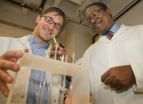(Press-News.org) Does thinking about time or money make you happier? A new study published in Psychological Science, a journal of the Association for Psychological Science, finds that people who are made to think about time plan to spend more of their time with the people in their lives while people who think about money fill their schedules with work, work, and—you guessed it—more work.
To find out how thinking about time or money makes people feel, Cassie Mogilner of the University of Pennsylvania designed an experiment, carried out online with adults from all over the United States, in which they concentrated on money or time. In this experiment, volunteers were asked to unscramble a series of sentences. Some participants were presented with sentences containing words related to time (e.g., "clock" and "day"), whereas others' sentences contained words related to money (e.g., "wealth" and "dollar"). Next all participants were asked how they planned to spend their next 24 hours. The ones who had been primed to think about time planned to spend more time socializing. People who'd been primed to think about money planned to spend more time working.
She also carried out the experiment on low-income people and found that having them think about time had the same effect, but having them think about money did not. This may mean that low-income people already live concerned about and, therefore, highly focused on money, Mogilner speculates.
But Mogilner wanted to test the effect in the real world, seeing how people actually spent their time. So her research team approached people going into a café on campus to ask them to take part in a questionnaire, which included the word-scrambling task that primed them with thoughts of time or money. These individuals were then watched to see how they spent their time in the café—whether they chatted with people there or on a cell phone, or whether they worked. When they left the café, they filled out a second questionnaire about how happy and satisfied they felt. The results were similar: People who were primed to think about time spent more time socializing and were happier, while people who were primed with money spent more time with their noses buried in books and were less happy when they emerged.
Although focusing on money motivates people to work more, passing the hours working does not generally make one happy. Spending time with loved ones does, and thinking about time might motivate people to pursue these social connections. "There is so much discussion and focus on money, optimal ways to spend and save it, and the relationship between money and happiness," says Mogilner. "We're often ignoring the ultimately more important resource, which is time." She does not suggest that people stop working altogether, but she does say that people need to be reminded to make time for friends and family.
###
For more information about this study, please contact Cassie Mogilner at mogilner@wharton.upenn.edu.
The APS journal Psychological Science is the highest ranked empirical journal in psychology. For a copy of the article "The Pursuit of Happiness: Time, Money, and Social Connection" and access to other Psychological Science research findings, please contact Keri Chiodo at 202-293-9300 or kchiodo@psychologicalscience.org.
END
PROVIDENCE, R.I. [Brown University] — As the United States seeks to lessen its reliance on foreign oil, biodiesel is expected to play a role. According to the National Renewable Energy Laboratory, a branch of the Department of Energy, biodiesel "represents a significant energy resource and could someday supply 3 percent to 5 percent of the distillate fuel market."
One major obstacle to achieving that goal is figuring how to efficiently convert the abundant stocks of waste vegetable oil (oil used after cooking French fries, for example) into biodiesel fuel. Current techniques ...
The way melanoma cells use the immune system to spread and develop into lung tumors may lead to a therapy to decrease development of these tumors, according to Penn State researchers.
"Melanoma is the most aggressive and metastatic form of skin cancer," said Gavin Robertson, professor of pharmacology, pathology, dermatology and surgery in the Penn State College of Medicine. "Therefore, identifying proteins and molecular mechanisms that regulate metastasis is important for developing drugs to treat this disease."
Metastasis is a complex process in which cancer cells ...
CAMBRIDGE, Mass. -- By creating a better way to see molecules at work in living brain cells, researchers affiliated with MIT's Picower Institute for Learning and Memory and the MIT Department of Chemistry are helping elucidate molecular mechanisms of synapse formation. These studies could also help further understanding of how synapses go awry in developmental diseases such as autism and Fragile X syndrome. The study will appear in the Oct. 7 issue of Cell.
Using the new technique, which is more accurate and sensitive than existing methods, the researchers found that ...
WASHINGTON—October 7, 2010—The U.S. invested $139 billion last year in health research from all public and private sources, according to Research!America's latest annual estimate. That amount represents only 5.6% of the $2.47 trillion overall U.S. health spending in 2009—or 5.6¢ of every health dollar—which varies no more than 0.2% from 2005 levels.
The estimate is available here: http://www.researchamerica.org/uploads/healthdollar09.pdf.
The 2009 investment grew by only 0.1% over 2008. This small increase can be attributed largely to the federal stimulus funding ...
NASA satellites have collected data as the Atlantic Ocean's Tropical Depression 17 has undergone two changes in less than 24 hours. Since Oct. 6, the depression has strengthened and has tropical storm-force winds and has morphed from a sub-tropical storm into a tropical storm.
After a United States Air Force Reserve reconnaissance flight subtropical depression seventeen was upgraded by the National Hurricane Center (NHC) to subtropical storm Otto on Oct. 6 at 5 p.m. EDT (2100 UTC). On Oct. 6 and 7, NASA's TRMM and Aqua satellites were flying overhead measuring very cold, ...
Saturn's icy moon Enceladus should not be one of the most promising places in our solar system to look for extraterrestrial life. Instead, it should have frozen solid billions of years ago. Located in the frigid outer solar system, it's too far from the sun to have oceans of liquid water -- a necessary ingredient for known forms of life -- on its surface.
Some worlds, like Mars or Jupiter's moon Europa, give hints that they might harbor liquid water beneath their surfaces. Mars is about 4,200 miles across and Europa almost 2,000 miles across. However, with a diameter ...
PHILADELPHIA - Heart muscle cells do not normally replicate in adult tissue, but multiply with abandoned during development. This is why the loss of heart muscle after a heart attack is so dire—you can't grow enough new heart muscle to make up for the loss.
A team of researchers at the University of Pennsylvania School of Medicine describe the interconnections between three-molecules that control fetal, heart-muscle-cell proliferation in a mouse model that will help cardiologists better understand the natural repair process after heart attacks and help scientists learn ...
CHAMPAIGN, Ill. — University of Illinois chemistry professor Alexander Scheeline wants to see high school students using their cell phones in class. Not for texting or surfing the Web, but as an analytical chemistry instrument.
Scheeline developed a method using a few basic, inexpensive supplies and a digital camera to build a spectrometer, an important basic chemistry instrument. Spectrophotometry is one of the most widely used means for identifying and quantifying materials in both physical and biological sciences.
"If we want to measure the amount of protein in ...
An approach pioneered by researchers at North Carolina State University gives scientists new insight into the way silicon bonds with other materials at the atomic level. This technique could lead to improved understanding of and control over bond formation at the atomic level, and opportunities for the creation of new devices and more efficient microchips.
Manufacturers build silicon-based devices from layers of different materials. Bonds – the chemical interaction between adjacent atoms – are what give materials their distinctive characteristics. "Essentially, a bond ...
New Haven, Conn.—A team of Yale University scientists has engineered the cell wall of the Staphylococcus aureus bacteria, tricking it into incorporating foreign small molecules and embedding them within the cell wall.
The finding, described online in the journal ACS Chemical Biology this week, represents the first time scientists have engineered the cell wall of a pathogenic "Gram-positive" bacteria—organisms responsible not only for Staph infections but also pneumonia, strep throat and many others. The discovery could pave the way for new methods of combating the bacteria ...



